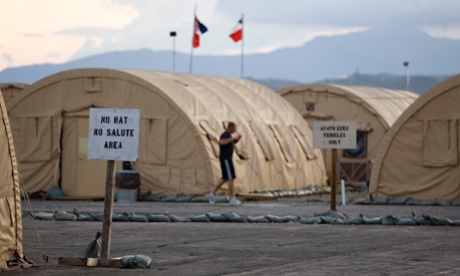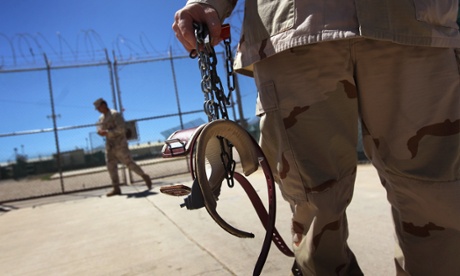Geneva panel share deep concerns over US record on host of different subjects, including racial inequality and Guantánamo
- theguardian.com, Thursday 13 March 2014 16.20 EDT

At the start of a two-day grilling of the US delegation, the committee’s 18 experts made clear their deep concerns about the US record across a raft of human rights issues. Many related to faultlines as old as America itself, such as guns and race.
Other issues were relative newcomers. The experts raised questions about the National Security Agency’s surveillance of digital communications in the wake of Edward Snowden’s revelations. It also intervened in this week’s dispute between the CIA and US senators by calling for declassification and release of the 6,300-page report into the Bush administration’s use of torture techniques and rendition that lay behind the current CIA-Senate dispute.
The committee is charged with upholding the International Covenant on Civil and Political Rights (ICCPR), a UN treaty that the US ratified in 1992. The current exercise, repeated every five years, is a purely voluntarily review, and the US will face no penalties should it choose to ignore the committee’s recommendations, which will appear in a final report in a few weeks’ time.
But the US is clearly sensitive to suggestions that it fails to live up to the human rights obligations enshrined in the convention – as signalled by the large size of its delegation to Geneva this week. And as an act of public shaming, Thursday’s encounter was frequently uncomfortable for the US.
The US came under sustained criticism for its global counter-terrorism tactics, including the use of unmanned drones to kill al-Qaida suspects, and its transfer of detainees to third countries that might practice torture, such as Algeria. Committee members also highlighted the Obama administration’s failure to prosecute any of the officials responsible for permitting waterboarding and other “enhanced interrogation” techniques under the previous administration.
Walter Kälin, a Swiss international human rights lawyer who sits on the committee, attacked the US government’s refusal to recognise the convention’s mandate over its actions beyond its own borders. The US has asserted since 1995 that the ICCPR does not apply to US actions beyond its borders - and has used that “extra-territoriality” claim to justify its actions in Guantánamo and in conflict zones.
Read More Here
.....
US responds to Guantánamo Bay and NSA criticisms made by UN committee
• Geneva delegation defends US record
• UN human rights body checks ICCPR commitments
• UN human rights body checks ICCPR commitments
- theguardian.com, Friday 14 March 2014 14.16 EDT

The US delegation delivered its rebuttal on Friday to the strong criticism it has faced from members of the UN human rights committee. Over two days, the committee has pressed hard questions about the US human rights record, from National Security Agency data mining to racial discrimination and rampant gun violence.
The interaction between the US and the committee is part of a process, completed every five years, to review whether the country is meeting its commitments under the International Covenant on Civil and Political Rights (ICCPR), which the US ratified in 1992. At the end of the process, the committee will produce a non-binding final report that is aimed at encouraging the US at all levels of government to improve its policies in areas of perceived weakness.
US officials sought to fend off the committee’s criticisms, focusing particularly on Guantánamo and the mass dragnet of data exposed by Edward Snowden. The delegation insisted that the 154 detainees still being held in Guantánamo are there “lawfully both under international law and US law”.
Officials disputed that any of the detainees had been “cleared for release”. Rather, they were subject to review board assessments every six months to see whether “continued lawful detention is necessary to protect against a continuing threat against the US”.
Just three days after the first Guantánamo detainee lodged the first legal challenge to force feeding at the base in a US federal court, alleging he had been subjected to a form of torture known as the “water cure”, the US delegation in Geneva claimed detainees had “access to exceptional healthcare” and said: “It is the policy of the US to support the preservation of life in a humane manner.”
Read More Here







No comments:
Post a Comment
Hello and thank you for visiting my blog. Please share your thoughts and leave a comment :)